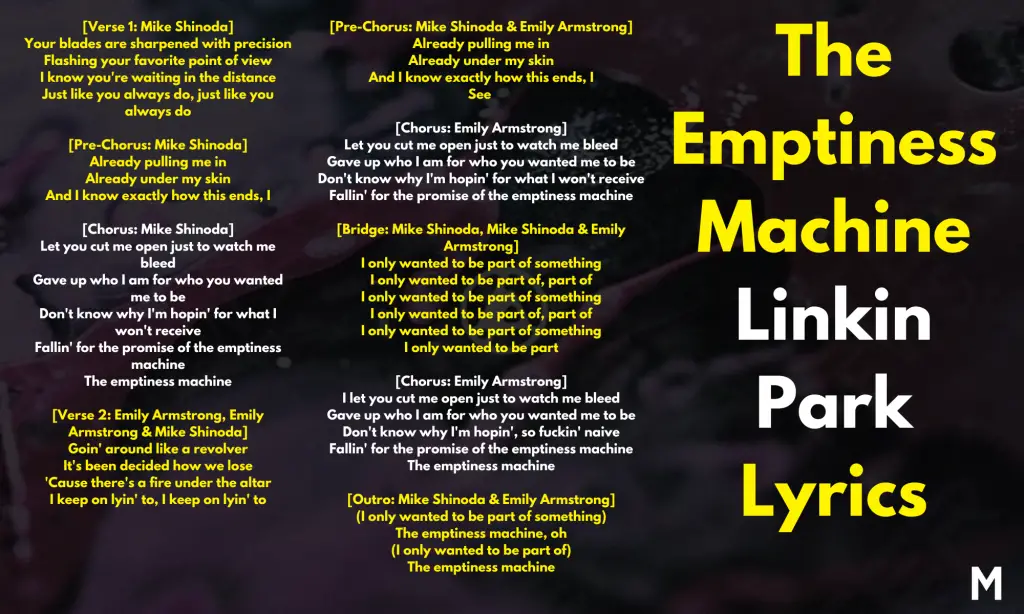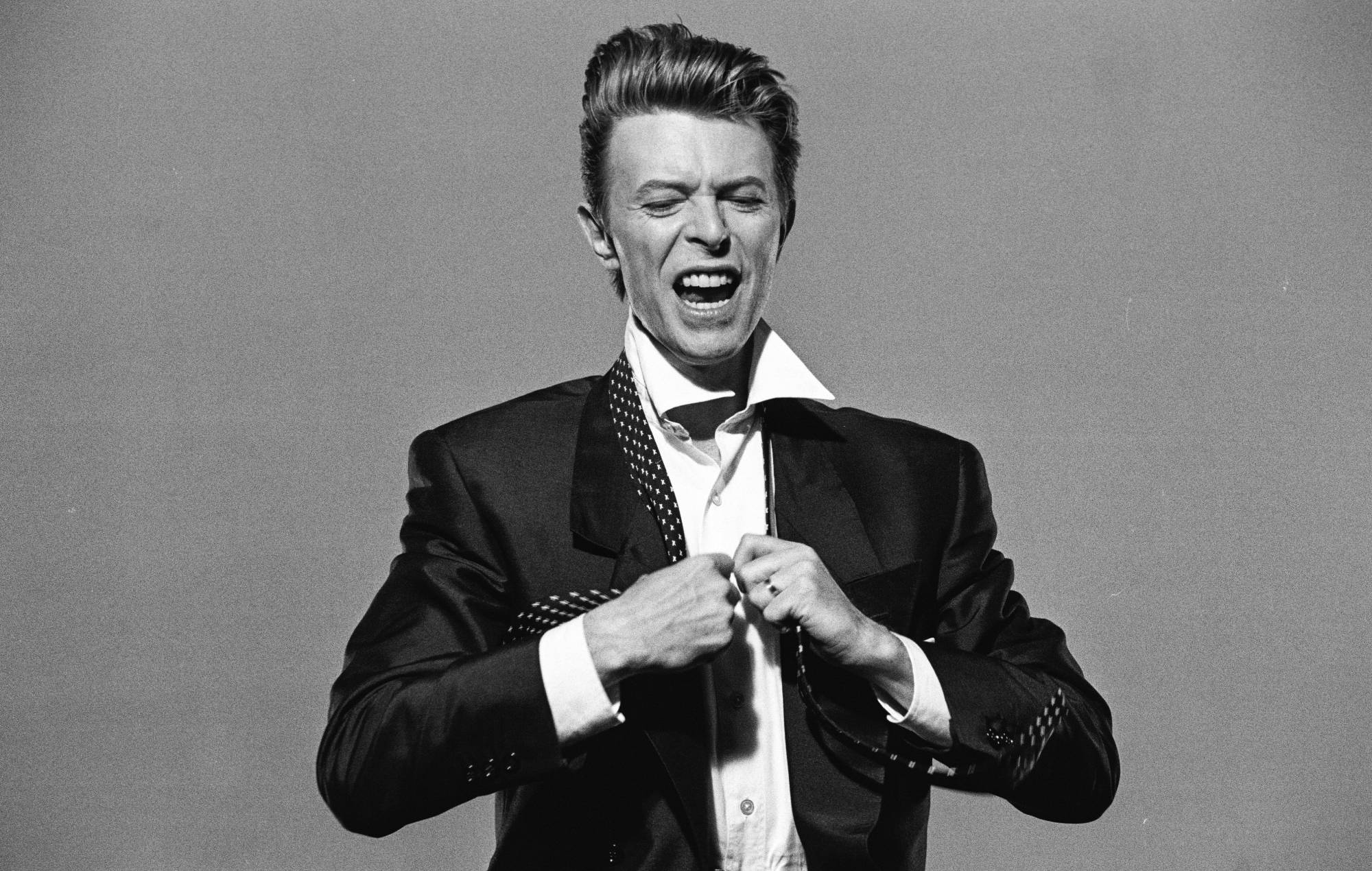Table of Contents
Images Courtesy Of Warner Brothers Records
Linkin Park just dropped a fresh new single that marks a stark divergence from their career trajectory, though not necessarily their sound. The band continues to rely on the familiar elements that have defined their music over the years, which raises an intriguing question: is there more to the lyrics of their new single, “The Emptiness Machine,” than what appears on the surface?
At first glance, it’s easy to interpret the visceral imagery of blades sharpening and cutting as a metaphor for a toxic romantic relationship. But another interpretation comes into focus when we take a step back and consider past interviews, the band’s commentary, and a deeper analysis of the lyrics. Instead of a toxic personal relationship, the song may actually personify the music industry itself—an industry that the band feels compelled to return to, despite its cyclical and stifling nature.
In this analysis, I’ll unpack the lyrics of “The Emptiness Machine” through this lens, referencing key interviews and employing close reading techniques similar to those used in literary analysis. While this interpretation is subjective and reflects only my perspective as someone with a background in English literature, yet I hope it offers an argument to the band’s complicated relationship with the music industry itself rather than a toxic romantic relationship.
So, let’s dive into the hidden truths behind the lyrics of Linkin Park’s “The Emptiness Machine.
[embed]https://youtube.com/watch?v=SRXH9AbT280&si=4W_wJ18BOg1p9Hlp[/embed]Linkin Park The Emptiness Machine Lyrics

The Emptiness Machine Meaning
“Your blades are sharpened with precision, flashing your favorite point of view”
This line sets the tone for the song by introducing the idea of emotional manipulation. The “blades” symbolize cutting words or actions, carefully honed to inflict the most damage. This stands in direct contrast to the expected motif of blades and swords in poetry, which often represents masculinity, honor, and courage.
The precision with which these blades are sharpened suggests that the harm is intentional and calculated, highlighting the manipulative nature of the relationship. Whereas oftentimes in poetic verse, blades are used to defend and honor, these blades are being used to cut down and hurt, worst yet as it’s to hurt someone, or something (which is something we’ll be building towards throughout this reading), the speaker once loved or even still loves to this day.
This imagery echoes the themes of emotional vulnerability spanning the past, present and future discussed in a recent article, where the band is dealing with the pressures and criticisms of their return. The “favorite point of view” could represent the way critics or toxic individuals impose their perspectives, disregarding the narrator’s feelings.
By the end of these lines, the song subtly shifts from a personal narrative to a broader commentary. The persistent presence of critics and doubters mirrors the protagonist’s internal struggles, suggesting that these patterns of behavior may not be isolated to just one individual but rather a reflection of a larger, more pervasive issue—potentially, the very industry in which the band operates.
“I know you’re waiting in the distance, just like you always do”
This line conveys a sense of inevitability and resignation, as the antagonist is depicted as lurking, waiting for the right moment to strike. This ongoing nature of the toxic relationship parallels the band’s experience of constantly facing criticism and scrutiny, particularly in the wake of Chester Bennington’s passing. The phrase “waiting in the distance” suggests a recurring, cyclical conflict, foreshadowing the later mention of a “revolver” that symbolizes the repetitive and inescapable nature of these challenges.
Here, the song subtly begins to shift from a personal narrative to a broader commentary. The persistent presence of critics and doubters mirrors the protagonist’s internal struggles, suggesting that these patterns of behavior may not be isolated to just one individual, but rather a reflection of a larger, more pervasive issue—potentially, the very industry in which the band operates.
“Already pulling me in, already under my skin”
These lines emphasize the inescapable nature of the toxic relationship.
The repetition of “already” shows how quickly the manipulation takes hold, penetrating the narrator’s defenses and getting “under their skin.” This idea of being drawn into a harmful situation despite knowing the outcome hits with the band’s own journey of returning to the spotlight, aware of the scrutiny they could, and would, face.
The articles highlight how the band has had to navigate these pressures, with Emily Armstrong stepping into a role that inevitably draws comparisons to the late Chester Bennington.
There’s an interesting interplay between the pre-chorus lyrics and the following chours lyrics. “Under my skin” is a common idiom to be used lightly, but when followed by lyrics such as “Let you cut me open,” perhaps shows hints that this hardship and the pain wrought by their partner is necessary if any form of liberation or freedom is to be obtained. Maybe, or maybe not?
It’s completely disconnected, really, but the images of the Scarabs being POPPED from underneath people’s skin in Brand Fraiser’s movie The Mummy continued to come to mind while I was thinking over these specific lyrics.
“Let you cut me open just to watch me bleed”
This line starkly portrays the narrator’s willingness to expose their vulnerability, only to be met with pain.
The act of being “cut open” symbolizes the emotional wounds inflicted by the toxic relationship, where the other party seems to take pleasure in the narrator’s suffering. The metaphor ties into the overarching theme of emotional exploitation, where the narrator sacrifices their well-being to appease the other person. This echoes the band’s own struggle with public expectations, as described in the reviews and articles linked above, where their every move is scrutinized, and their efforts to please are often met with criticism.
This agresion and criticism seems to be part and parcel with the bands careers and personal lives.
“Gave up who I am for who you wanted me to be”
This line touches on the loss of identity, a central theme in the song. The narrator admits to sacrificing their true self in an attempt to meet someone else’s expectations, a common experience in toxic relationships. This idea of losing oneself to please others is also reflected in the band’s narrative, particularly in how they’ve had to reinvent themselves in the wake of Bennington’s death while still trying to maintain their core identity.
This is far from a new notion for the band, as they sang of this exact same sentiment in their song “Numb,” with the lyrics “I’m tired of being what you want me to be // Feeling so faithless, lost under the surface.”
On a micro-scale, we see the constant reminder of the cyclical patterns of the song’s protagonist; stepping back on a macro scale, it’s the same cyclicality of the band’s entire journey and the laurels which they’ve cannot seem to not rest upon.
“Fallin’ for the promise of the emptiness machine”
The “emptiness machine” is a powerful metaphor for the false promises that lure the narrator into a cycle of disappointment. The machine offers fulfillment but ultimately leaves the person feeling drained and hollow. While on the surface, it can be easy to read into this as being a romantic partner, but by viewing the lyrics through a different lense, one that we’ve slowly been building through this close reading, we can start to see that maybe, potentially, this could also be the music industry and life in the hyper-levels of limelight that come with being a mega-level band.
Though I will admit that this could be my own projection here, as I’ve worked in the music industry for a decade now and have witnessed first hand the toll that being a professional artist can bring to people and the the fact that most people who strive their entire lives to “make it” in music have no idea what it’s like on the inside or even if they’re cut out for the lifestyle that being a tourist artist, even an entry-level one, consists of.
This metaphor reflects the band’s own experience with the music industry, where the pressure to deliver hits and meet fan expectations can feel like an “emptiness machine.” Despite the allure of success, the process can be emotionally exhausting.
“Goin’ around like a revolver, it’s been decided how we lose”
The imagery of the “revolver” suggests a cyclical, inevitable pattern of conflict or loss that has been one of the main recurring themes of the song.
The narrator feels trapped in a situation where the outcome is predetermined, much like a revolver that continuously fires. This line reflects the futility of fighting against a system or relationship that is rigged against you. It ties back to the themes of disillusionment and hopelessness, where the narrator is caught in a loop of unfulfilled promises.
The articles touch on how the band has had to face the challenges of reentering a music scene that has changed since their hiatus, with some critics already doubting their success.
“There’s a fire under the altar, I keep on lyin’ to”
This line introduces the idea of hidden emotions and internal conflict. The “fire under the altar” symbolizes suppressed feelings that continue to burn beneath the surface, causing the narrator to deceive themselves.
The altar, a place of worship or sacrifice, suggests that the narrator is offering up parts of themselves to keep the relationship or situation alive, even as it consumes them. This metaphor speaks to Link Park’s own experience of dealing with the expectations placed on them by fans and critics, as described in the articles. The “fire” represents their passion and creativity, even if it’s hidden underneath something with perceived weight and importance (the music vs. the music industry).
“I only wanted to be part of something”
This line captures the narrator’s deep-seated desire for connection and belonging, a sentiment that drives much of the song’s emotional weight. The repetition of “I only wanted to be part of” underscores the narrator’s vulnerability and willingness to compromise their identity to feel accepted.
This desire for belonging is a universal theme that resonates with many, including the band themselves, as they re-enter the music industry. But the thing which they “below” too is far more of a hamster wheel without end than a loving community. Even when you “make it” in music, there’s always something or somebody telling you you could and should go further which adds more pressure to an already skin-boiling industry.
“Don’t know why I’m hopin’, so fuckin’ naive”
In this line, the narrator acknowledges their naivety, recognizing the futility of their hopes and the inevitability of their disappointment. The use of explicit language here adds a raw, unfiltered emotion to the lyrics, emphasizing the frustration and self-awareness that come with repeated disillusionment.
This line could also be seen as a reflection of the band’s awareness of the challenges they face with their new lineup and direction.
This line encapsulates the tension between hope and reality, a theme that runs throughout the song and the band’s current journey and the insatiable desire to push music and their passion for it, further even if they’re already at the top. It’s the hope and nativity that got them to the level of fame and fortune they’re at in the first place and something that continues to draw them in like a magnet, even against their own best wishes and intentions.
The post Linkin Park The Emptiness Machine Lyrics And Meaning: Darker Thruths Behind Emily Armstrong’s Debut appeared first on Magnetic Magazine.



